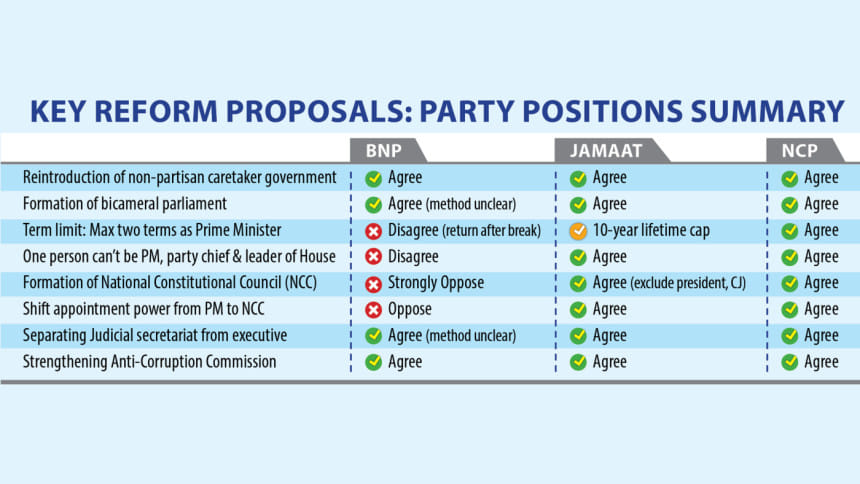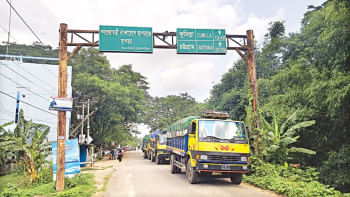Consensus on reforms: Political parties yet to find common ground on key proposals

The first round of talks between the National Consensus Commission and 33 political parties concluded on Monday, with broad agreement on several reform principles -- including the reintroduction of a non-partisan caretaker government, the formation of a bicameral parliament, independence of the judiciary, and a stronger Anti-Corruption Commission.
However, sharp disagreements remain on key constitutional reforms aimed at decentralising executive power and reshaping top leadership structures.
At the heart of the deadlock is the proposal to limit the prime minister's authority and bar any individual from holding the posts of prime minister, party chief, and leader of the house simultaneously.
The commission also proposed capping a person's premiership to two terms, which BNP rejected. The party instead suggested that a person could serve two consecutive terms, step aside, and later return.
It also opposed barring one person from holding multiple leadership roles, saying such decisions should be left to internal party mechanisms.
Jamaat-e-Islami proposed a lifetime limit of 10 years for anyone serving as prime minister and backed separating the roles of PM and party chief. The National Citizens Party supported both the two-term cap and leadership separation.
Disagreements Over National Constitutional Council
Another flashpoint was the commission's proposal to create a National Constitutional Council (NCC), comprising representatives from the executive, legislature, and judiciary, to recommend appointments to constitutional positions, including heads of the armed forces.
Currently, the president is constitutionally bound to act on the prime minister's advice in such appointments.
The council would dilute this authority, shifting more influence to a collective body -- a change the BNP strongly opposed, arguing it would weaken elected governments.
Conversely, Jamaat and the NCP welcomed the idea.
However, Jamaat proposed that the president and chief justice be excluded from the council's composition.
Instead of an NCC, the BNP pushed for a law to enhance presidential authority, though it provided no specifics, saying the matter should be left to the next elected parliament.
Besides, the commission's proposal to amend Article 70 of the Constitution -- to allow MPs to vote independently in all matters except financial bills -- was met with mixed reactions.
The BNP and Jamaat both supported limited voting freedom, exempting confidence motions, budgets, and constitutional amendments. The NCP took a more liberal stance, backing full voting freedom for MPs, while calling for safeguards to prevent instability.
Meanwhile, a bicameral parliament and a non-partisan caretaker government to oversee elections received widespread backing. However, opinions differed on how to elect members of the proposed upper house, with the commission favouring proportional representation.
Several other proposals remain undecided, including mechanisms for declaring state emergencies, amending the constitution, electing the president, ratifying international treaties, and the number of reserved seats for women.
Despite the disagreements, parties expressed general support for the commission's broader efforts.
Jamaat claimed to have backed over 120 of the 166 reform proposals, while the BNP said it supported most, albeit with reservations on key points.
The commission -- one of six formed by the interim government in October -- compiled the proposals from five reform bodies covering the constitution, electoral system, public administration, judiciary, and anti-corruption. Police reform proposals were excluded from this phase.
Between March 20 and May 19, the commission held consultations with 33 parties. The BNP participated in three sessions, while Jamaat, the NCP, and the Communist Party of Bangladesh each joined two.
Chief Adviser Prof Muhammad Yunus heads the commission, with Prof Ali Riaz serving as vice-president.
Riaz told The Daily Star that the second round of talks, expected in late May or early June, would focus on bridging remaining divides and producing a "July Charter" reflecting national consensus on reforms.

 For all latest news, follow The Daily Star's Google News channel.
For all latest news, follow The Daily Star's Google News channel. 



Comments